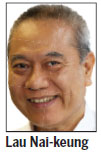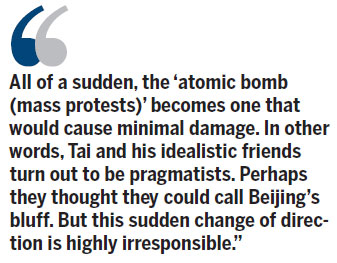Benny Tai's Bloomberg remarks are irresponsible
Updated: 2014-09-04 07:35
By Lau Nai-keung(HK Edition)
|
|||||||||

Benny Tai Yiu-ting has difficulty understanding the difference between idealism and pragmatism. These two beliefs are usually thought of as being opposites, and therefore one must choose one or the other.
Idealism is the belief that we should adopt moral principles, even if they have a negative effect on our lives. The idealist is willing to suffer in order to do what he thinks is right. An example of an idealist is a monk who takes a vow of poverty, sacrificing his material interest in order to follow his moral ideals.
Pragmatism is a rejection of idealism. If idealist principles get in the way, the pragmatist resolves this by rejecting moral principles. A pragmatist does whatever is deemed practical, with much less concern about morality.
This idealism/pragmatism dichotomy is somewhat imposed, as in reality we are more often than not in the middle, and are more properly labeled as being either idealistic pragmatists or pragmatic idealists. However, Benny Tai has given the "Occupy Central" movement a highly idealistic approach from the very beginning. The "manifesto" of the movement proclaims: "If the authorities concerned ignore the democratic demands of the citizens and suggest an election method, which violates the corresponding international standards, we shall at the appropriate time carry out acts of civil disobedience, including 'Occupy Central'." He has famously referred to the tactics of mass protests as an "atomic bomb", arguing they have the ability to paralyze Central and force the central government into submission.
A couple of days ago, Tai told Bloomberg that when business executives know the details of when "Occupy" will be launched, they will realize the movement has no intention of damaging the economy of Hong Kong. "Even though I cannot mention the date, but if you look at the calendar, you would know which date would cause the minimal damage to Hong Kong's economy," Tai said.
All of a sudden, the "atomic bomb" becomes one that would cause minimal damage. In other words, Tai and his idealistic friends turn out to be pragmatists. Perhaps they thought they could call Beijing's bluff. But this sudden change of direction is highly irresponsible.

After Tai's Bloomberg appearance, people have the impression that the original organizers are now stepping back, and radicals will step in to control the movement. This trend is already apparent as students are now planning to "boycott" classes.
Tai is not the only irresponsible academic around. There are a lot of them. The head of the University of Hong Kong has announced that students and staff members are free to take part in "Occupy" and other protests, adding that legal advice would be provided to anyone arrested during a demonstration. A couple of other universities are also saying that they will accommodate the students' "boycott."
While university students have the right not to attend classes and many habitually don't, it is hard to understand why the universities approve of this. Our university heads can join the "civil disobedience movements" and be arrested, but it is irresponsible for them to encourage students to do the same. If they do not know where to draw the line, then perhaps they should not be in their jobs.
Tai told the truth in the Bloomberg interview: He said the number of people joining "Occupy" would not be as many as expected, because of the "very pragmatic thinking of Hong Kong people". Accepting the ruling of the National People's Congress Standing Committee would be in line with Hongkongers' pragmatism. Therefore our legislators, especially those from the "pan-democratic" camp should vote for the coming political reform proposal.
After Tai's Bloomberg appearance, "Occupy" released a statement saying "it is not correct to say that we have less support from the community after Beijing made the decision. Although some pragmatic supporters may leave, new supporters are joining us because they are angry about the Chinese government's decision and are firm to show the dignity and willpower of Hongkongers." Notwithstanding the discrepancies between the statement and Tai's comments, the most responsible thing for "Occupy" to do is to call an end to the campaign. This would prevent the radicals from letting things get out of control.
The author is a veteran current affairs commentator.
(HK Edition 09/04/2014 page1)